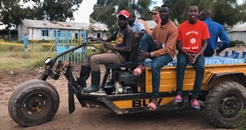 Transforming communities through transport and enterprise
Transforming communities through transport and enterprise
The Institute for Affordable Transportation (IAT) is a not-for-profit charity devoted to improving the lives of the world’s poor by developing and building basic vehicles that facilitate community transformation — bridging the gap between vital services and people in need. More than basic transport solutions, they are lifting up people and creating opportunities.
Their Basic Utility Vehicle (BUV) has been designed travel the roughest tracks in developing countries. They are robust, easy to maintain vehicles that represent a first/last mile solution for small-holder farmers and communities. BUVs go where the roads have no name, and obstacles lurk at every turn. Any load. Any time. They cost around £5000.
Not only are they robust but they are easy to assemble and represent an opportunity for entrepreneurs in country to set up assembly, maintenance and repair businesses.
The design elements, constantly improved over time, have been; simplicity, easy to build, repair and use, very high payload to weight ratio for commercial use, reliable and robust, use of standard parts and common locally available materials, safety, etc.
The BUVs have been a tremendous blessing to rural villages, especially those with limited access to transport services. The benefits have been seen as:
-
Poverty reduction. Isolation is closely linked with poverty. Without mobility, opportunity is distant. BUVs are poverty busters and profit makers. Up to 40% of crops and produce spoil in Africa. The farmers simply cannot get them to market.
-
Education. BUVs allow more children to access school. The children’s best hours are focused on learning (not on collecting water). Less time travelling to and from school means more time in class and better attentiveness.
-
Enterprise. BUVs facilitate businesses which create jobs for local workers. The possibilities are endless – ranging from a single owner transport business to a small business employing several vehicles and drivers to a factory employing even more local workers.
-
Time. In Africa alone, women average 3 hours per day transporting water and fuel (typically wood). Access to transport gives communities more time to grow food, earn an income, and go to school — all of which fight poverty.
-
Health. BUVs give expecting mothers a break by transporting them to the clinic safely — not on a bike, motorcycle, or donkey. 30% of births in Africa occur in unsanitary locations because the mum could not get to a clinic in time. This leads to many problems…even death.
-
Women Empowerment. Africa has demonstrated a commitment to promoting gender equality. Women collect 72% of the water in sub-Saharan Africa and 60% of the fuel (typically wood). If you empower them with basic vehicles, you free up their time, they start businesses, improve their homes, and take charge of their own futures.
They have a two-pronged distribution approach:
1. Mission
The BUVs represent a tool for missionaries and the local church to meet needs, both their own and those of the community. BUVs can help establish relationships through service — whether delivering food, construction materials, or transporting the sick, BUVs allow missionaries to carry out their mission and transform lives. Over 250 BUVs have been shipped to 33 countries throughout the world.
2. Business
They license vehicle designs and provide technical assistance to factory partners who build the BUVs in developing countries. They share with their partners what has worked well with selling/servicing BUVs in various countries. They help identify financing for transport entrepreneurs to purchase BUVs. Finally, they provide training solutions to empower BUV drivers to grow and deliver vital services. There is a rent-to-own option for trained drivers which helps sales.
Watch this 2 minute video:
Could you help buy a vehicle for a community? Could you help set up a business in country to provide employment and transport options?
Their website is here.
Retweet about this article:
Geoff Knott, 27/01/2021